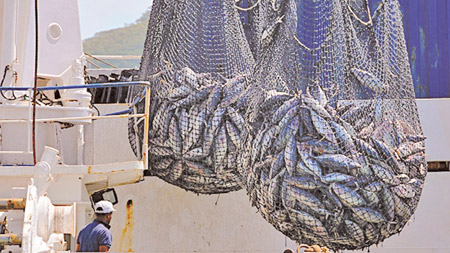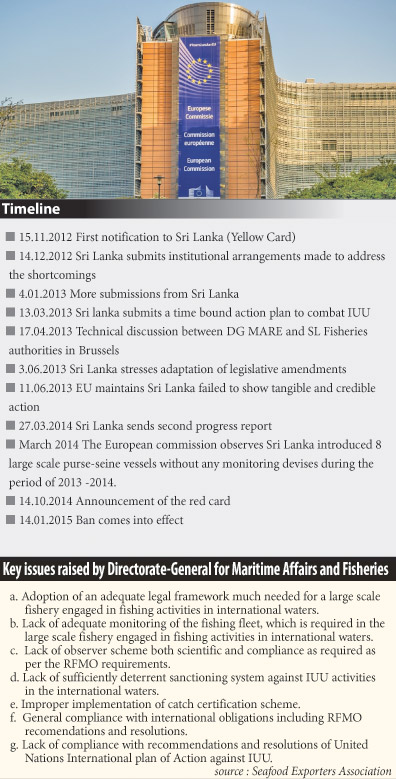|
EU lifts ban:
Fisheries exports to bounce back
by Manjula Fernando
The European Commission last week gave the initial clearance to
resume Sri Lanka’s fisheries exports to the 28 nation-strong region,
lifting a ban that was clamped down since January 2015, depriving the
country of US $100 million per annum in foreign exchange.
 |
|
Netting in shoals of fish
for export - techadvisor.lk |
Congratulating Sri Lanka’s achievement, EU Ambassador in Colombo
David Daly told the Sunday Observer, Sri Lanka and the the EU developed
an exceptional partnership through the past months in combating the
illegal fishing trade worldwide.
Speaking from Kandy, Daly said “Sri lanka has made excellent progress
in improving a national fisheries governance system.
“The political leadership shown by President Maithripala Sirisena and
Prime Minister Ranil Wickremesinghe was exceptional.”
He also thanked Fisheries Ministry Secretary W.M.M.R.Adikari and
Director General of the Fisheries Department Christy Lal Fernando for
the lead roles they played to lift the ban.
Although the decision by the Commission to lift the Red Card should
also get the approval from 28 Fisheries Ministers in the EU Council for
it to become fully effective, this is considered only a formality.
Hence, Sri Lanka is expected to resume it’s fisheries exports to EU
countries by July this year.
 Before
Sri Lanka lost its rights to export fish products to the EU, in 2014, it
exported nearly 10,000 metric tonnes of seafood to the region earning US
$ 100 million that year. The fisheries sector generated a total of US$
266.5 million in export earnings that year. The exports in 2013
accounted for 74 million Euros. Sri Lanka was the second largest
exporter of fresh tuna and chilled swordfish to the EU. Before
Sri Lanka lost its rights to export fish products to the EU, in 2014, it
exported nearly 10,000 metric tonnes of seafood to the region earning US
$ 100 million that year. The fisheries sector generated a total of US$
266.5 million in export earnings that year. The exports in 2013
accounted for 74 million Euros. Sri Lanka was the second largest
exporter of fresh tuna and chilled swordfish to the EU.
Of the total fisheries exports, exports to the EU accounted for 45
percent, according to the Seafood Exporters Association Chairman Prabash
Subasinghe. Subasinghe said Sri Lanka gained new markets during the
period it was under the Red Card of the European Commision but the ban
was a major blow to the industry and it did not even come close to
recovering the total loss.
Processed fish
Sri Lanka started exporting processed fish products to Russia and the
Middle East in a bid to offset EU losses. Some processing plants
imported raw material from the Maldives and India for value addition to
be done here and re-export to keep the EU regulators satisfied.
It took over one year for Sri Lanka to work and impress upon the EU
bloc to withdraw the Red Card issued based on Illegal, Unreported and
Unregulated (IUU) regulations introduced by the EU in 2010 to combat
illegal fishing practices worldwide.
“By today, Sri Lanka has amended its legal framework, strengthened
sanctions and improved its fleet control,” the EU said in a statement
announcing the lifting of trade sanctions on Thursday.
The European commission said Ghana, Papua New Guinea, Korea, the
Philippines, Fiji, Belize, Panama, Togo and Vanuatu reformed their
fisheries management systems after warnings from them. The European
Commission issued a Yellow Card warning to Sri Lanka over a lack of
regulation to stop illegal fishing in Sri Lankan waters in 2012. On a
decision in October 14, 2014 a full ban was imposed three months later.
It became effective in January 2016, a week after President Maithripala
Sirisena assumed office.
According to the Commission, the EU began monitoring Sri Lanka as far
back as 2010 and the discussion to get Sri Lanka to comply with
international standards have been progressing since 2012. Fisheries
Ministry Secretary Adikari said the resumption of fisheries exports was
a great relief for the local fisher community.
Around 272,140 active fishermen engage in marine and inland fisheries
and 1,023,780 members of their household depend on the income from
fishing and related activities.
Sri Lanka has met 36-time bound tasks that were in the road map
presented by the EU to stop IUU fishing in the country’s territorial
waters. This included introducing several amendments to the Fisheries
Act and introducing a vessel monitoring system.
“Sri Lanka has shown other countries what can be done individually to
combat illegal fishing,” the EU Ambassador said adding that impressively
the country has developed a system today, to send alerts from Colombo to
every boat operating in the high seas.
In addition to the 36 time-bound tasks, the sector needs to
consistently comply with another 21 on-going tasks including regular
port inspections, maintaining log books, capacity-building and
monitoring the movement of vessels.
Director General of the Fisheries Department Fernando said they hope
to increase the volume of fisheries exports to the region, exceeding the
2014 figures once the EU market is reinstated. He said the 32 processing
factories were running under capacity at the moment.
Fish prices have soared
“World fish prices have soared since 2014 and there is no limit or
quota to what Sri Lanka can export,” he said therefore, the industry is
expected to bounce back within months.
Fisheries and Aquatic resources Minister Mahinda Amaraweera said most
of the given tasks, such as upgrading the factories and the vessels
contributed positively to uplift the local fisheries sector, therefore
the EU sactions were a blessing in disguise.
“Following the ban Sri Lanka’s exporters explored new markets, and in
that sense there were positive outcomes as well,” he added.
Although some have criticised the ban as a political move against the
former administration, Fisheries Department DG said with the global
warming and other factors leading to depleted fish stocks globally, the
EU is also bracing for a global food shortage. It is strictly monitoring
countries with which they have dealings.
While announcing the lifting of the ban on Sri Lanka, the EU called
for action on three other countries Kiribati, Sierra Leone and Trinidad
& Tobago with Yellow Cards. It has also extended the Yellow Card issued
on Thailand, the world’s third largest exporter of seafood.
Immediately after the ban was imposed in January 2016, only a week
after President Maithripala Sirisena took office, the government geared
into action with the Prime Minister summoning a hurried meeting at
Temple Trees to address the issue. Special emphasis was given by the
government to get the export of fisheries products and the GSP + trade
concessions reinstated.
With these two missions in hand Foreign Minister Mangala Samaraweera
travelled to Brussels, in late January 2015. However, with the opening
of the EU market, there is fear that local prices of fish could further
soar due to supply constraints.
This has already been brought to the attention of the authorities and
discussions are focusing on manufacturing bigger vessels and arming
fishermen with latest technology to increase the harvest.
|

